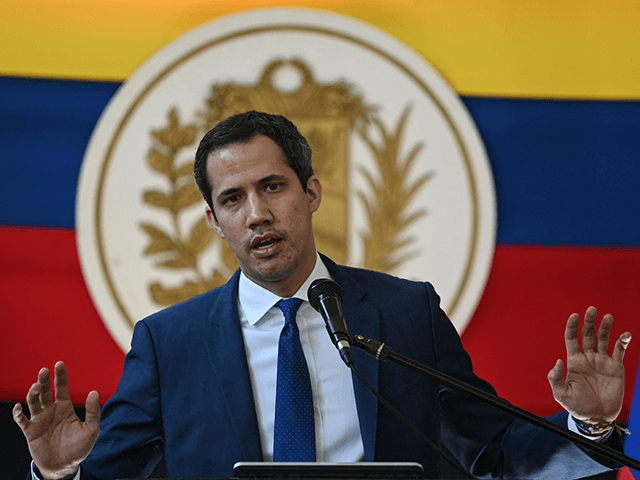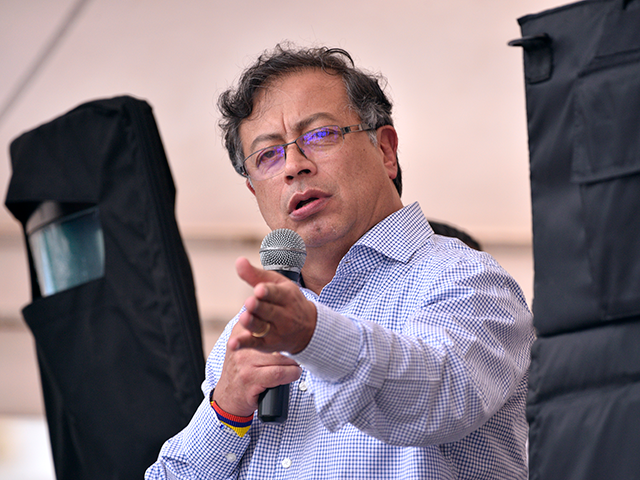CARACAS, Venezuela – Reports published this week indicate that Colombia’s new far-left president Gustavo Petro is kick-starting diplomatic and trade relations with Venezuela’s socialist dictator Nicolás Maduro.
Petro has reportedly begun preparations to officially reopen the Colombian-Venezuelan border, even as Colombia’s Marxist National Liberation Army (ELN) terrorist organization engages in new abductions of Colombian soldiers. The ELN, like the similar Revolutionary Armed Forces of Colombia (FARC), is believed to maintain relations with the Maduro regime.
More directly, the Maduro regime has repeatedly threatened war, and even a Ukraine-style invasion, against Colombia – threats that Petro has mostly ignored.
The neighboring countries had broken all ties in 2019 at the height of Venezuela’s presidential and political crisis that surged after Maduro held sham elections in 2018 and refused to step down when his last legal term ended in January 2019.
As a result, and as Venezuela’s constitution stipulates, National Assembly lawmaker Juan Guaidó became Venezuela’s interim president. Guaidó was officially recognized as such by the international community, including the United States during the Trump administration and Colombia during the administration of Iván Duque.
Maduro responded to Duque’s recognition of Guaidó by breaking all ties with Colombia and kicking their diplomatic and consular personnel out in February 2019. Maduro also blocked the entry of humanitarian aid from Colombia and ordered the closure of all official passageways and bridges that connect Venezuela with Colombia, placing containers and barricades that lasted until October 2021.

Venezuelan opposition leader Juan Guaido gestures while speaking during a press conference at the Morichal Park the day after regional and municipal elections in Caracas on November 22, 2021. (YURI CORTEZ/AFP via Getty Images)
During his 2022 presidential campaign, the recently sworn-in president of Colombia, Gustavo Petro, expressed his intention to renew ties with the Maduro regime should he be elected. During Petro’s swearing in ceremony, Maduro (who had to watch it on tv as he was banned from attending by Duque’s government), said that he was willing to “rebuild the friendship” with Colombia.
Truth to his word, on August 12, Petro, a former member of the Marxist guerrilla group himself, designated a new ambassador to Venezuela within the first week of his four-year government. Maduro reciprocated by announcing a new ambassador to Colombia on that same day.
Since then, both governments have engaged in preliminary talks to formally thaw diplomatic and commercial ties. Maduro has also ordered the renewal of military relations between both countries.
The diplomatic rapprochement between Petro and Maduro and eventual full reopening of the Colombian-Venezuelan takes place as the ELN terrorist organization kidnapped two Colombian soldiers near the Venezuelan border on Wednesday. Previous reports indicate that the Maduro regime has granted leeway to ELN forces to operate in Venezuela. Duque, Petro’s predecessor, accused Maduro at the United Nations in 2019 of aiding both the ELN and FARC.
President Juan Guaidó, who has claimed to hold “informal meetings” with the Petro administration, criticized Petro’s exchange of ambassadors with Maduro during a press conference on August 12.
“I would have preferred that his [Petro’s] first decision would have been to protect the most vulnerable and not to approach those who protect Latin American and global terrorism in Venezuela, and I must be categorical in this,” Guaidó said in reference to the 2.5 million Venezuelan migrants that are currently living in Colombia having fled from the Maduro’s socialist regime.
Petro defended the establishment of ties with the Maduro regime on Monday by deeming Guaidó a “nonexistent” president due to his inability to exert any sort of power in the country.
“Yes, sure. He [Guaido] does not have control in Venezuela,” Petro said in an interview given to the Colombian news magazine Semana on Monday.
The Biden administration, which officially recognizes Guaidó’s presidency, expressed its respect for the establishment of relations between Colombia and the Maduro regime.
“We respect the sovereign right of governments to establish diplomatic relations,” said a State Department spokesman to the EFE news agency on Wednesday
The rollercoaster of border tensions between Colombia and Venezuela goes all the way back to the days of Hugo Chávez and the presidencies of Álvaro Uribe and Juan Manuel Santos. In 2008, Chávez had ordered the closure of the borders with Colombia and had moved a military contingent to the border after Colombian forces assaulted a FARC camp located in Ecuador, taking down one of the most prominent FARC leading figures, Raúl Reyes.
Christian K. Caruzo is a Venezuelan writer and documents life under socialism. You can follow him on Twitter here.

COMMENTS
Please let us know if you're having issues with commenting.